#cynthia asquith
Explore tagged Tumblr posts
Text

It has been good Christmas, and better yet, when mister Bradley does one of his readings again, and it always makes me laugh seeing him making pinhead festive too!
youtube
#pinhead#doug bradley#christmas#Cynthia Asquith#audiobooks#it has been great Christmas to me - no material gifts but so many emotional ones from friends family and top of all that also this#video post#Youtube
20 notes
·
View notes
Text
Images of 1912 fashion -
Left 1912 (April) Afternoon dress by Beer, Les Modes - photo by Talbot. From les-modes.tumblr.com/page/21 784X1920.
Center 1912 (June issue) Robe d'après-midi par Redfern from Les Modes. From Bibliothèque nationale de France via Wikimedia; fixed spots w Pshop 1453X2265.
Right 1912 (January) Tailored afternoon suit by Linker & Co., Les Modes - photo by Félix. From les-modes.tumblr.com/page/14 705X1920.

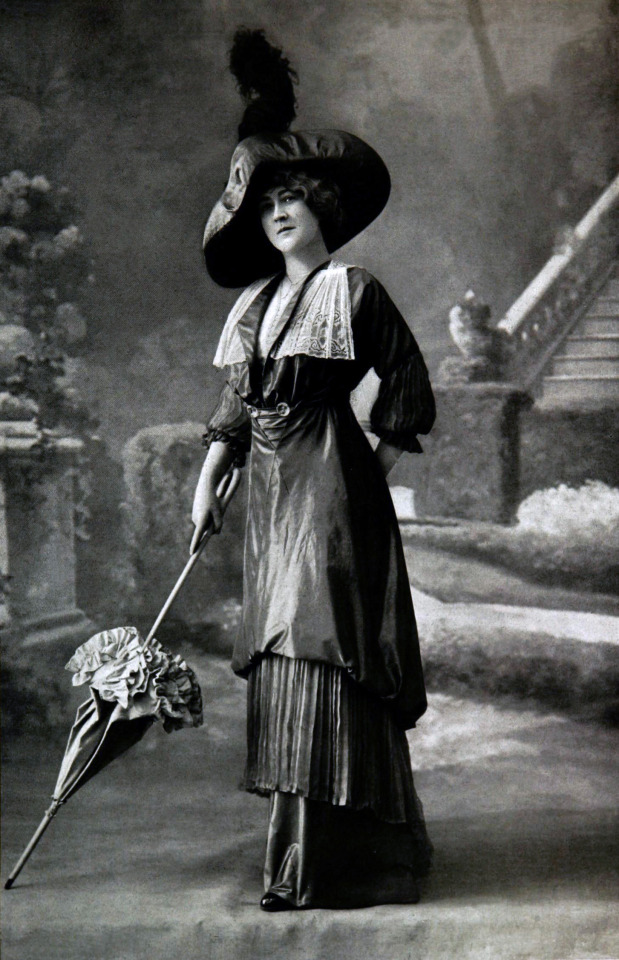
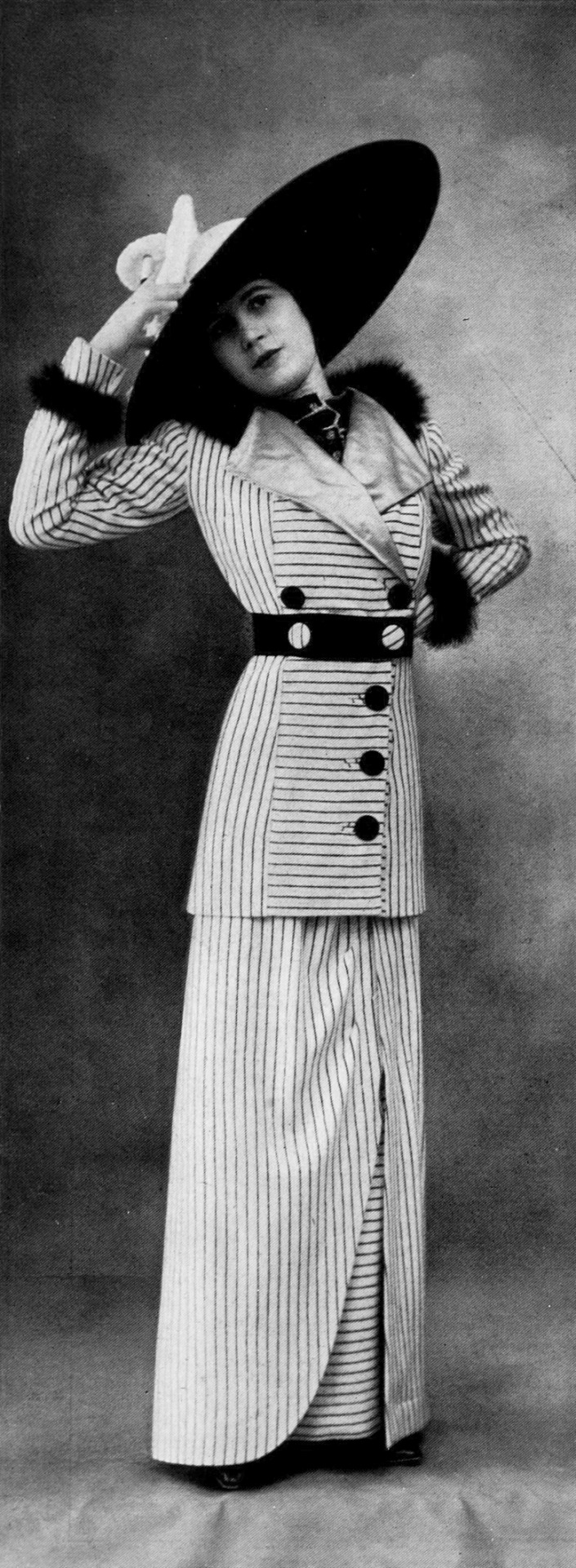
Left 1912 (August issue) Journal des Demoiselles print by A. Baeurlé (Rijksmuseum - Amsterdam, Netherlands). From their Web site 3277X4834.
Right 1912 Journal des Dames et des Modes. From tumblr.com/antiquebee/733887948520652800/journal-des-dames-et-des-modes-1912? 956X1705.

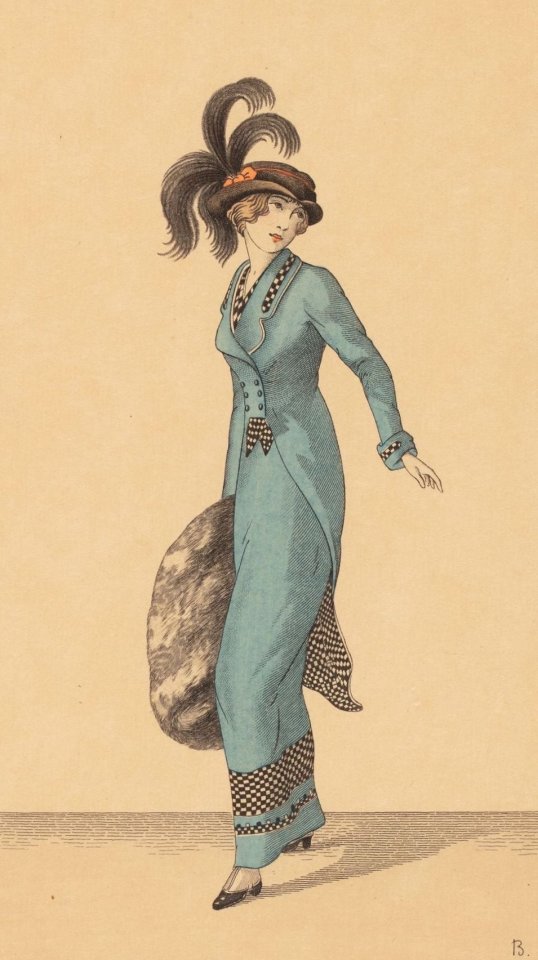
Left 1912 (September) Laferrière evening gown - photo by Félix, Les Modes. From les-modes.tumblr.com/page/10; fixed bigger spots w Pshop 1265X1920.
Right 1912 (September) Lelong evening gown, Les Modes - photo by Talbot. From les-modes.tumblr.com/page/10 1236X1920.

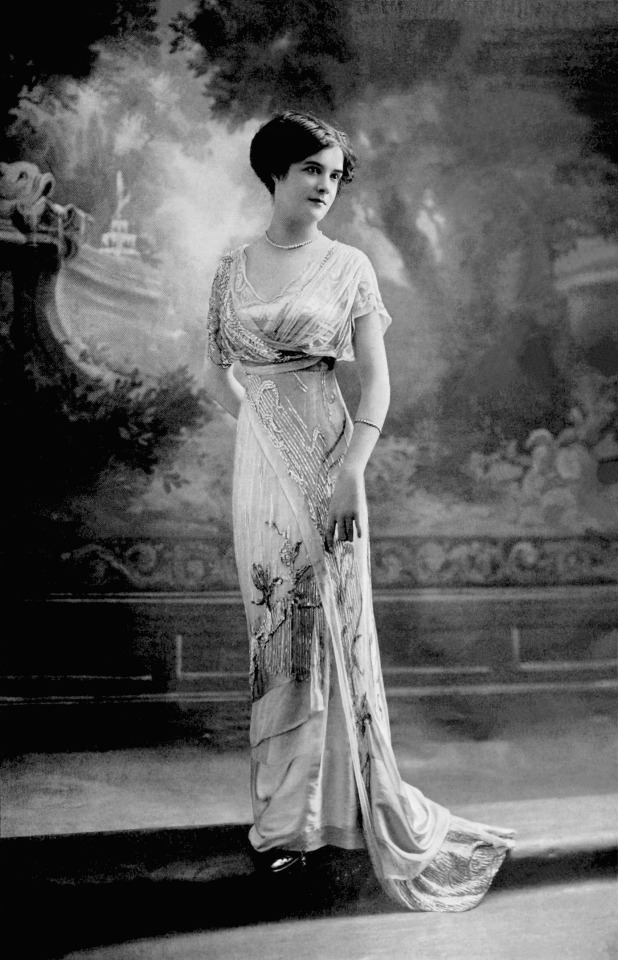
1912 (Winter) Jeanne Paquin evening gown (Helen Larson Historic Fashion Collection, FIDM Museum - Los Angeles, California, USA). From atkinreport.com/2015/07/21/television-academy-fetes-its-costume-design-emmy-nominees/ 1200X1600.

1912 (June) Vita Sackville-West at Ascot cropped 1396X1022
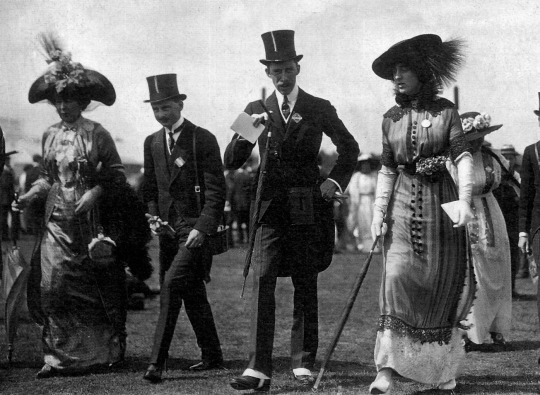
1912 (May) Dresses for the races by J. Dukes, photo by Reutlinger. From castaroundlesmodes.tumblr.com/post/68584847179/my-little-time-machine-dress-for-the-races-by?is_related_post=1 1280X1877.

Left 1912 Afternoon dress by Jeanne Hallée (Metropolitan Museum of Art - New York City, New York, USA). From their Web site 2568X2760.
Right 1912 (September issue) Robe d'après-midi par Redfern from Les Modes. From Bibliothèque nationale de France via Wikimedia; fixed bigger spots w Pshop & trimmed 1334X2118.
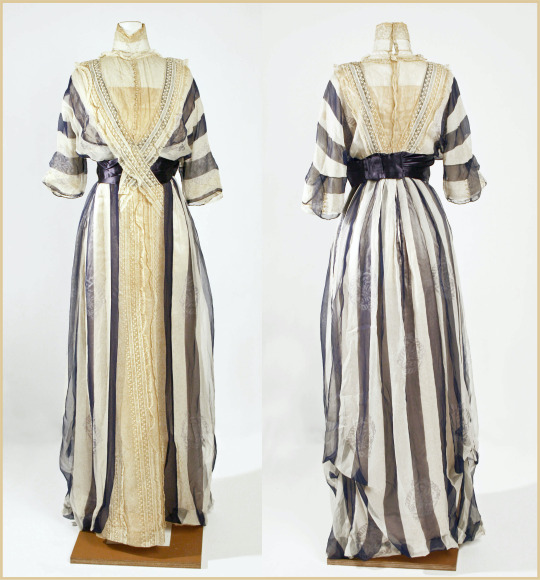
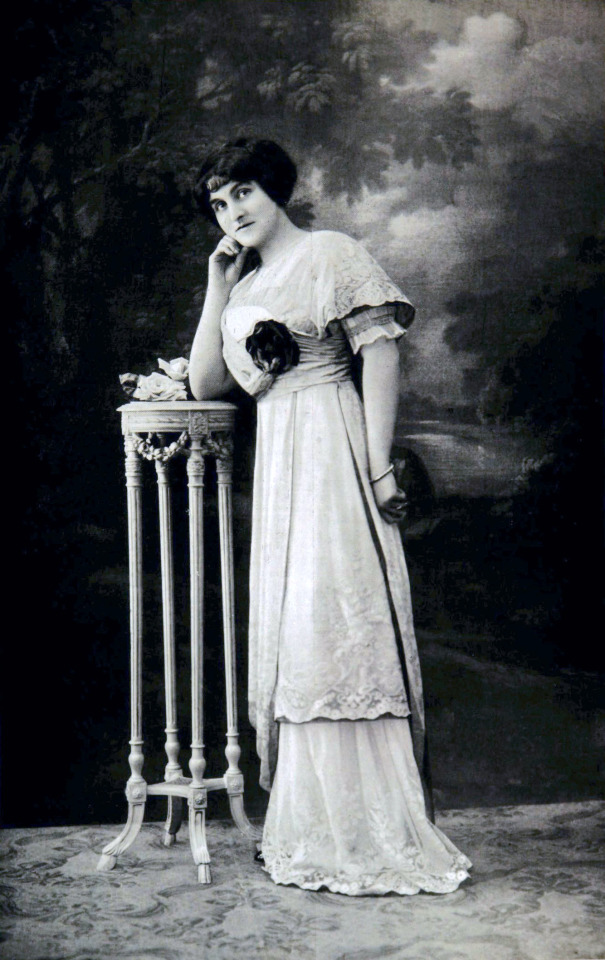
1912 Frieda Countess Logothetti née Baroness Zwiedinek of Südenhorst (1866-1945) by Karel Žádník (Slovácké Muzeum - Uherské Hradiště, Zlin Region Czech Republic). From Wikimedia 2784X3855.

Left 1912 Gustav Beer dress (National Gallery of Victoria - Melbourne, Victoria, Australia). From tumblr.com/lenkaastrelenkaa 1280X1855.
Right 1912 L'Adieu dans la nuit. Robe du soir de Paquin (pl.9, in La Gazette du Bon ton, 1912-1913 n°6) by André-Edouard Marty. From edition-originale.com/en/ 1680X2528.

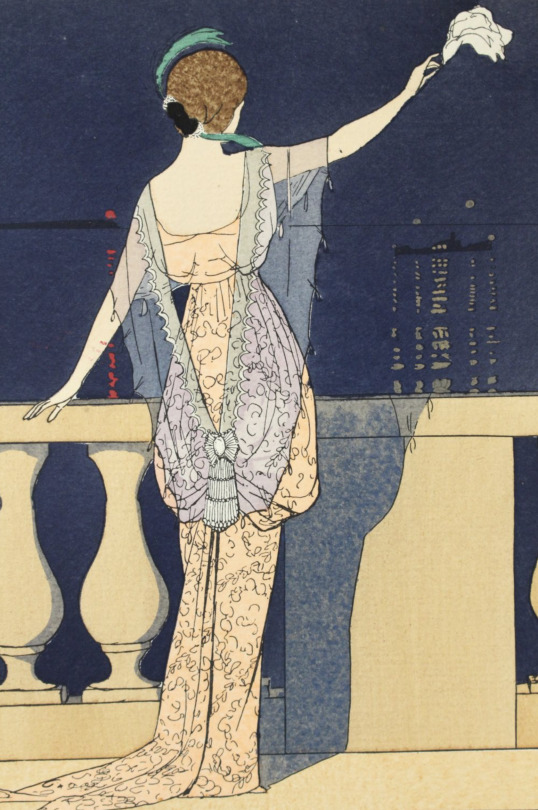
1912 Ladies attending the Henley Regatta in wide-brim hats, a feathered boa and curved-heel shoes. From vogue.co.uk/gallery/style-file-1912?image=5d54889ce144470008e44627 1280X1920.
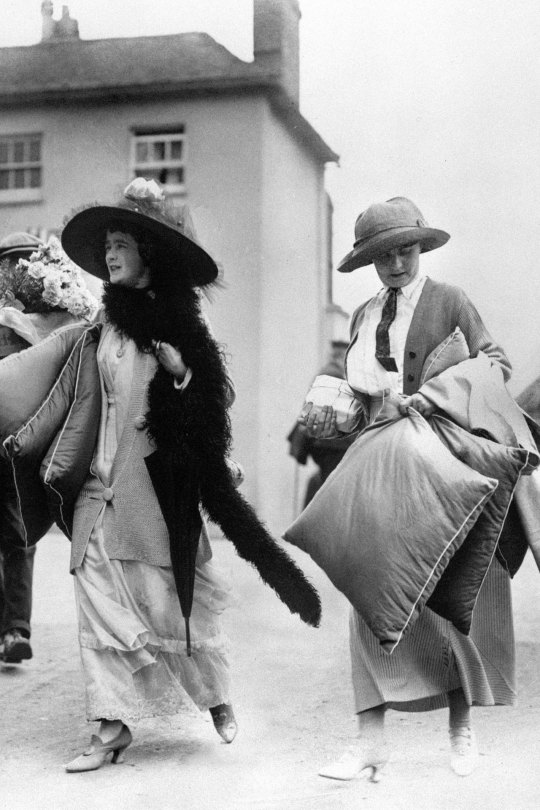
1912 Lady Cynthia Asquith by Bassano front and side 5112X3325.

1912 "Sorbet" by Paul Poiret (Victoria and Albert Museum). From omgthatdress.tumblr.com/page/2490.

#1912 fashion#1910s fashion#Belle Époque fashion#Edwardian fashion#Gustave Beer#Redfern & Sons#William Henry Fox Talbot#Linker & Co.#Félix#A. Baeurlé#Madeleine Laferrière#Lelong#Jeanne Paquin#Vita Sackville-West#J. Dukes#Reutlinger#Jeanne Hallée#Frieda Countess Logothetti#Karel Žádník#Cynthia Asquith#Bassano#Poiret#sorbet dress#flared over-skirt
25 notes
·
View notes
Text
Rare classic weird tales anthology published by Solar Press Books


#bookblr#weird tales#weird fiction#classic fiction#lost books#independent publishing#cynthia asquith#solar press books#book recommendations#book reccs
3 notes
·
View notes
Text

Lady Cynthia Mary Evelyn Asquith (née Charteris; 27 September 1887 – 31 March 1960) was an English writer and socialite, known for her ghost stories and diaries. She also wrote novels, edited a number of anthologies, wrote for children and covered the British Royal family.
2 notes
·
View notes
Text

Cynthia Asquith (editor) - When Churchyards Yawn - Arrow - 1963
#witches#yawners#occult#vintage#when churchyards yawn#churchyards#yawn#arrow books#cynthia asquith#1963#stories#ghost stories#various authors
9 notes
·
View notes
Photo

The Third Ghost Book, edited by Lacy Cynthia Asquith (Pan, 1957).
From eBay.
9 notes
·
View notes
Text

cover art for The Ghost Book, Cynthia Asquith, 1970
103 notes
·
View notes
Text













These are from two different sources of two different cuts of the original film. The sepia-tinted ones are from StephenTennant.org and the pure black and white clips are from the documentary "Love Cecil." TBH I have no idea how the scenes weave together to form a story. I placed them in the way that both videos came to me, but there are obviously pieces that are edited out for some reason.

Photos from Cecils scrapbook (I think?) So, what was the plot? How did this come about? Serious Pleasures, pg 107-08: Towards the end of May, Stephen and Cecil were weekend guests at Savay Farm, the country home of Oswald Mosley and his first wife, Cynthia*. There they dressed up in Cynthia's mother's old Edwardian clothes and "did the most fantastic dances as passed description for effeteness, tho brilliance was in every line". Both boys had stayed with the Mosleys before, and on one such summer visit Oswald had his cine-camera on hand to film their escapades. The result was the only such film of Stephen to survive from the period.
An outdoor performance was decided upon, and a story line devised. Beaton was the powdered Madam of a brothel, engaged in tempting the men of the party, John Strachey and Dick Wyndham. Cimmie was one of the girls in Cecil's charge; and Stephen, in one of his favorite costumes of the time, was a mysterious blind beggar boy whose significance to the plot remains unclear. Cecil had assembled a disguise of a false nose and bouffant wig to caricature Margot Asquith (Stephen's aunt), and towards the end of the drama, runs off to drown him/herself in the river, a sequence made hilarious by the fact that his wig began to float off in the fast-running stream, completely ruining the dramatic effect. Stephen, too, wore makeup, but his was a pale white mask, with pencilled eyebrows and those bee-stung lips with which he sought to emulate Hollywood starlets. Staggering daintily about, clad in silken rags, he holds his arms out, feeling his way as he imagined a blind boy would. He sits and makes daisy chains by the river; and later plunges in too, only this time looking more like Ophelia than Cecil's amusing performance - with echoes of Narcissus, Shelley, and presaging Jean Cocteau's art films - he tips his head back into the water, over the river bank, poetically drowning. Only from this filmed evidence can the unreality of Stephen's presence be judged. With long, fine limbs and a graceful gait, he resembles a whitened stick insect, stalking his way through the crackly black and white silent film. (end quote) * * * Stephen is dressed in green rags. It seems to consist of a normal button-down collared shirt, over which is another long button-down shirt, sleeves cut off, worn unbuttoned like an open waistcoat that has been cut into long shreds. His trousers are ankle-length and have been completely cut into shreds and the cuts travel very high up the thighs. At one point you see the camera pan down to his revealed hip and possible cheek. In the past, Rex said he hated that costume because it was too *revealing*. Ahem. 🤭
#Stephen Tennant#Cecil Beaton#Bright Young Things#Film#Gifs#Villain#Bright Young People#acting#pretending#play#1920s#silent film#1920s cinema#oswald mosley
23 notes
·
View notes
Text
Danielstown and the Gothic:
In today’s session we dedicated a lot of time to talking about both the Gothic elements that can be found throughout “The Last September”, as well as the phenomenon of the Anglo-Irish country house. In the following I would like to comment on both of these topics, referencing two very interesting pieces of research. The first one of these is a text by the literary scholar Stephen Ross titled “Elizabeth Bowen’s Uncertain Gothic”. In this he comments on an introduction Bowen had written for a collection called “The second Ghost Book”, which features short stories from a wide range of British writers, including Cynthia Asquith, Lord Dunsany, Walter de la Mare and Bowen herself. Here Bowen states:
In former days, Christian burial of ill-used remains, the evening-up of an ancient score or putting right of a wrong used to settle the matter; now it is not so simple. Ghosts seem harder to please than we are; it is as though they haunted for haunting’s sake—much as we re-live, brood and smoulder over our pasts.[1]
Ross comments on this line of thought, arguing that “there’s a sense of history and tradition already at work here, a version of continuity in which the original reasons for doing something are lost but the force of convention alone urges its further repetition”.[2] This statement seems to hold much truth for the “Last September”, as Lord and Lady Naylor and by extension also their guests seem to be stuck in a never-ending performance of a mode of life that clearly belongs to the past, as the world around them is changing at an increasing rate. This is however ignored at all times, as stolen glances,[3] averted eyes,[4] and in some cases even conversations between the characters show.[5] The novel, as Ross in acknowledgement of literary scholar Sinead Mooney writes, thus becomes one of constant paralysis and continuing impasse,[6] in which an “automized repetition allows for an ordering of existence without the necessity of ever taking action”.[7] This never taking action seems to be what is weighing on Lois as well, as she often finds herself reminiscing of getting out of Danielstown in some way or another, but can never really bring herself to do so, except for in the end, when the reader is informed that she has left for Tours to improve her French.[8] Interestingly, she is not the only one, that is discontent with her stay, as Laurence wishes he could escape to Spain[9] and Marda begins to regrets his visit in a matter of hours.[10] Taking all these sentiments into account, it seems as if the house is indeed weighing down on his inhabitants, rendering them restless, while turning them stuporous at the same time.
But how? If we follow Teresa Trout’s argumentation in her dissertation “The modernist country novel” it becomes clear, that the country house is not only an architectural landmark, but also a social stage, as it functions as both a home, as well as a public medium, by displaying wealth and power and in the context of the Anglo-Irish specifically the wealth and power of a colonial power ruling over the country.[11] Trout thus dubs the country-house a “show-house”, their residents an ever-changing set of actors.[12]
Throughout the novel we can see an acknowledgement of this double naturedness to the extensive use of theatre-based vocabulary in relation to the country, the house and its inhabitants: “Here the few beeches stood, unrelated, lovely, desultory; between their trunks – the tall mountains, vivid in a suffusion of distant light. The scene glittered”[13], “Recollection of Laura were now wiped for him from the startingly green valley, leaving the scene dull”[14], “Hugo was pleased with the place; here he seemed to have stepped through into some kind of non-existence. And here, divorced equally from fact and from probability, he set up a stage for himself: the hall’s half-light”.[15] or “She could not hope to explain that her youth seemed to her also rather theatrical and that she was only young in that way because people expected it. She had never refused a role.[16] Pairing this with the history-infused interior of the house which among other things encompasses a “crowd of portraits”[17] under whose constant surveillance the family is placed, as well as a “troop of ebony elephants brought back from India by someone she did not remember”[18] that has been placed on “two locked bookcases of which the key had been lost”,[19] and the lack of any personal stories that the family members could accord to any of these objects, it becomes clear, that the house is a greater agent of the family’s history than the family itself.[20] Rather than them leaving their mark upon Danielstown, their relation to Danielstown has forced them to do the exact same things as their predecessors have, namely, to wear lavish costumes and throw great parties and uphold an image, that has become more and more outdated.[21]
As we discussed in class, the Gothic generally speaking presents readers with an uncanny present whose origins lie in a traumatic past which have to be expiated if a viable future is supposed to come about.[22] It however simultaneously caters to a prurient interest in the perversion or diversion of political, economic, familial or sexual acts that are purged through a commitment to a conservative future.[23] But whereas in Dracula for instance the vampire is killed, and the patriarchal and heterosexual order of the late Victorian society is restored, “The last September” does not end with the successful defence of the house. Instead Danielstown goes up in flames, and even if we are not told the ensuing events, one can assume, that Lord and Lady Naylor are now being displaced and the land that their English ancestors claimed is being returned to the Irish. The usual Gothic convention is thus confounded, at least if we do not take into consideration, that the erection and existence of Danielstown itself might be seen as the real perversion of the novel.[24]
[1] View Elizabeth Bowen: Introduction to the Second Ghost Book. In: The Green Book. Writings on Irish Gothic, Supernatural and Fantastic Literature 9 (2017), p. 7-10. Here p. 8.
[2] View Stephen Ross: Spectrality in Modernist Fiction. London 2023, p. 134.
[3] She glanced closely at Mrs Carey’s profile, to see that her exact shade of meaning had been taken. View Elizabeth Bowen: The Last September. London 1998, p. 218.
[4] Sir Richard and Lady Naylor, not saying anything, did not look at each other, for in the light from the sky they saw too distinctly. View Ibid, p. 387.
[5] How far do you think this war is going to go? Will there ever be anything we can do except not notice? View Ibid, p. 159.
[6] View Ross: Spectrality in Modernist Fiction, p. 134.
[7] View Ibid, 134.
[8] “Oh no”, said Lady Naylor surprised. “Tours. For her French you know.” Bowen: The Last September, p. 383.
[9] “I have no money; where do you expect me to get any money from? I was to have gone to Spain this month with a man and last year I should have gone to Italy with another man, but what do you expect me to go on? I have to eat somewhere, don’t I, and here it is simply a matter of family feeling.”, View Ibid, p. S. 90.
[10] “But I really should not have come back here”, she said. “There is something in Lady Naylor’s eye: a despairing optimism.”, View Ibid, p. 159.
[11] View Teresa Trout: Open to the Public: The modernist Country House novel. Online: http://nrs.harvard.edu/urn-3:HUL.InstRepos:42029702 (last accessed 01.12.2024), p. 154.
[12] View Ibid, p. 93.
[13] View Bowen: The Last September, p. 162-163.
[14] View Ibid, p. 230.
[15] View Ibid, p. 332.
[16] View Ibid, p. 68.
[17] View Ibid, p. 53.
[18] View Ibid, p. 27.
[19] View Ibid, p. 27.
[20] View Trout: The modernist country house novel, p. 166.
[21] View Ibid, 154.
[22] View Ross: Spectrality in Modernist Fiction, p. 134.
[23] View Ibid, p. 134.
[24] View Ibid, p. 151.
0 notes
Video
youtube
Escritoras del siglo XX. Cuentos de fantasmas.
El seguidor, de Cynthia Asquith
La señora Meade, ingresada en una clínica por una afección cardíaca, relató al doctor Stone su obsesión con un hombre siniestro que había marcado su vida con apariciones escalofriantes. Este hombre, con una mirada malévola y una presencia perturbadora, había comenzado a acosarla años atrás, convirtiéndose en una figura recurrente de sus miedos y pesadillas. A pesar de mudanzas y esfuerzos por evitarlo, su presencia seguía acechándola en momentos cruciales de su vida, incluso cuando estuvo a punto de sufrir un accidente mortal en un taxi.
Finalmente, al recibir al supuesto doctor Stone en su habitación, el visitante reveló ser ese hombre aterrador. Al quitarse la máscara, la señora Meade soltó un grito desgarrador antes de morir, mientras el verdadero doctor Stone llegaba y confirmaba que no había nadie más en la habitación.
0 notes
Text
“God Grante That She Lye Stille” (Cynthia Asquith)
I’m a little confused as to why this story is in a science fiction collection (The Venus Factor, from 1977, which I’ve had on my shelf forever and which apparently shares a name with a diet book, to the chagrin of at least one Amazon reviewer). This is a pretty respectable ghost story—big house, sins of ancestors, young and sensitive woman, manly doctor POV character. It’s not science fiction in any discernible way, but there’s enough interesting or compelling stuff in there with the familiar to make it worth reading. Its climactic moment of horror, which I will not spoil, is executed in a way that I would call… “classic.” What it doesn’t describe is made so much scarier by the little that it does. There’s a… “tastefulness” to it (a reluctance to over-indulge in luridness but with an in-universe excuse) that I’d casually, unduly associate with old gothic modes, if we assume an un-modern chasteness the way one tends to.
The story also contains the line “Just let me Ancient-Mariner you,” which is a delightful use of Samuel Taylor Coleridge’s famous poem as a verb, something I have never seen before.
My criticism would be that I think this idea could have been expanded into a novella. There’s some acceleration of events that works well to build tension and to compel you to read it in one go, but you could also imagine it drawn out over more pages as well.
Google prioritizes an adaptation of the story, which I have to imagine could be annoying if Asquith and/or the original “God Grante…” has/have fans. Or I’m projecting my own snobbishness.
0 notes
Text

LADY CYNTHIA ASQUITH The Second Ghost Book Paperbacks From Hell Vintage GHOST
0 notes
Text

1912 Lady Cynthia Asquith by Bassano front and side 5112X3325.
17 notes
·
View notes
Text
Character Bio of the Afro Asian Native Human with Fae Elvish, Goblinoid, Giant kin ancestry Adventurer who is a Spellcaster, Gunslinger, & Sword Master Part 6
Companions:
Allies:
Rose Winfield is a Magical human squire.
Nicholas Kaylock is a Magical human initiate.
Lillian Colfield is a Magical human aspirant.
Tobias Jenkings is a Magical human pageboy.
Adelaide Camden is a Magical human page girl.
Zachary Leighton is a Magical human courtier.
Helena Dixon is a Magical human apprentice.
Asher Covington is a Magical human esquire.
Phoebe Mast is a Magical human lady knight.
Preston Kahler is a Magical human knight.
Pierre Barnes is a Magical human lancer knight.
Josephina Lytton is a Magical human knight sergeant.
Liam Morgan is a Magical human knight lieutenant.
Henrietta O' Keefe is a Magical human knight captain.
Reginald Marple is a magical human knight templar.
Royce Harvey is a Magical human knight commander.
Cynthia Barrington is a Magical human paladin.
Joel Bradford is a Magical human high paladin.
Phillipa Belleville is a Magical human grand paladin.
Noah Marfont is a Magical human star paladin.
Daniella Blackwood is a Magical human paladin justicar.
Ian Asquith is a Magical human paladin commander.
Cornelius La-Minnings is a Magical human knight and paladin guild chapter master.
Harper Weston is a Magical human elder. She is the subordinate of High Elder Lysander/Luciana. She is Lysander’s/Luciana’s protege.
Peerage of Lysander/Luciana Norwood:
Genevieve Slater is a Magical human lady in waiting. Attends Lysander/Luciana when she/they is Luciana Norwood.
Luca Merriweather is a Magical human diplomat.
Tiffany Fitzgerald is a Magical human chancellor.
Jacob Weston is a Magical human minister.
Vivienne Ashdown is a Magical human orator.
Theodore Lynch is a Magical human baronet. Peerage of Lysander/Luciana.
Diane Carlyle is a Magical human baronetess. She is part of the peerage of Lysander/Luciana.
Oscar Richfield is a Magical human baron. Peerage of Lysander/Luciana.
Charlene Haganis is a Magical human baroness. Peerage of Lysander/Luciana.
Michael Whitely is a Magical human viscount. Peerage of Lysander/Luciana.
Eleanora Ashbridge is a Magical human viscountess. Peerage of Lysander/Luciana.
Walter Beaumont is a Magical human count. Peerage of Lysander/Luciana.
Lily Bexley is a Magical human countess. Peerage of Lysander/Luciana.
Victor Herington is a Magical human marquess. Peerage of Lysander/Luciana.
Carolina Brighton is a Magical human marchioness. Peerage of Lysander/Luciana.
Clark Mavis is a Magical human duke. Peerage of Lysander/Luciana.
Gabriella Gainsborough is a Magical human duchess. Peerage of Lysander/Luciana.
Darby Rutherford is a Magical human archduke. Peerage of Lysander/Luciana.
Viola Pierpont is a Magical human archduchess. Peerage of Lysander/Luciana.
Harrison Tate is a Magical human vizier. He is the advisor of High King/High Queen Lysander/Luciana.
Margaretta Pierson is a Magical human grand vizier. She is the advisor of High King/High Queen Lysander/Luciana.
Members of Luciana/Lysander Norwood’s Court:
Courts are a web of conspiracies. It is a place of scheming, power plays, intrigue, & machinations. This was a decadent court.
Chika Nakagawa. Female Ambassador.
Artist. Sponsored artists. The monarch’s favorite artists. A group of the finest actors, cooks, dancers, directors, fashion designers, models, musicians, painters, photographers, playwrights, poets, sculptures, singers, theater thespians, & writers, etc in the empire, confederacy, & federation. They weren’t there for their own ambition. The monarchy and the upper class are inclined to support the arts. They wanted to show off their investments. So these artists are their accessories to show off. Though being in the court of a monarch is a good way for artists to increase their patrons.
Bodyguards. Cadre of foreign bodyguards. An elite group of highly trained, disciplined, & competent male, female, & two spirit hobgoblin, orc, troll, oni, goliath, & giant mercenaries. Mercenaries who distinguished themselves on the battlefield stood a good chance of being hired for a bodyguard job as a permanent exclusive contract. They are now a group of a praetorian guard to the monarch.
Ahmose Idogbe. A male butler. The chief supervisor of all male manservants of a house.
Katlego Mba. A male castellan. The Castellan oversees the defense of a stronghold.
Andromeda Farmakis. A female chamberlain. Chamberlain makes decisions for the royal household in the monarch’s absence.
Liona Keawe a female chancellor. An officer of an order of knighthood who seals commissions.
Albus Ovius a male chapelmaster. A person in charge of music-making.
Nicholas Dupont a male chaplain. A member of the clergy attached to a private chapel, institution, ship, regiment, etc.
Phillippe Leclerc a male offerer of the Household. The holder who paid the wages of some of the servants above and below stairs.
Concubines. Full of male, female, & nonbinary members of more humanoid species such as aasimar, draenei, dwarves, elves, giants, gnomes, halflings, humans, ogre, oni, orcs, teiflings, & trolls.
Alexander Seidel is a male confessor. A priest who hears confessions and gives absolution and spiritual counsel.
Anna Wolf is a female constable. A person holding a particular office, most commonly in criminal law enforcement.
Courtiers. Important not because of their inheritance or offices but because the regent has an affection for them. There is a certain charm, boldness, cleverness, honesty, strength, & beauty that caught the monarch’s eye. Their influence on the leader is not easily measured.
Mira Benes is the Court Jester or Royal Fool. A professional joker or fool at a medieval court. They are typically wearing a cap with bells on it. They are usually carrying a mock scepter. A member of the household of a nobleman or a monarch employed to entertain guests. Jesters were also performers who entertained the common folk at fairs, carnivals, and town markets. Jesters are often thought to have worn brightly colored clothes and eccentric hats in a motley pattern. Jesters entertained with a wide variety of skills such as song, dance, playing musical instruments (a lute or a harp), spoken word poetry, storytelling, acrobatics, juggling, telling jokes, and performing magic tricks. Much of the entertainment was performed in a comic style. Many jesters made contemporary jokes in words or songs about people or events well known to their audiences. A halfling bard who was a former member of the king/queen’s guild party. They were a court wizard and spymaster for the sovereign in secret. They have the king’s ear and can speak freely using truth to power as an honest advisor under the guise of silliness. They are a power behind the throne. They are a very dangerous bard who spies on people for the king in other nations.
Cup-bearer. A person who serves wine, especially in a royal or noble household.
Court Mage. The Court Mage has access to knowledge and cosmic powers none of the others understand and may be critical on the battlefield. The court mage was an arch mage. The court mage was a magic user for a sovereign to provide mystical advice and give magical services. This court mage was an alchemist, wizard, & sorcerer. They have high standing with other mages and the king/queen. Has a bad relationship with other court members.
The Chaplain. The Chaplain is the religious leader of the noble household.
Dapifer. An official who is appointed by the legal ruling monarch to represent them in a country, and may have a mandate to govern it in their name.
Doorward. A person given the responsibility of being warden of the king’s door: protecting the king’s property.
Falconer. A person involved in falconry and hunting.
General. The General is the highest military commander.
Gentleman of the Bedchamber. A person involved in waiting on the King when he ate in private, helping him to dress, guarding the bedchamber and water closet, and providing companionship.
Gentleman Usher. A person or people responsible for overseeing the work of the servants “above stairs”, particularly those who cooked and waited upon the nobleman at meals, and saw to it the great chamber was kept clean by the lesser servants. This person was also responsible for overseeing other miscellaneous services such as the care of the nobleman’s chapel and bed-chambers.
Grand Master/Grand Mistress. The supreme head of various orders, including chivalric orders such as military orders and dynastic orders of knighthood.
General. The General is the highest military commander.
Great Officers of the Crown. A person or head of a religious order or order of knighthood often conferring with the King and other members of the royal court.
Guard Captain. The Guard Captain is the commander of the house guard.
Harem. There is intense competition between them to carry the monarch’s favor. There is a tense relationship between them and the high queen of the magical humans and them and the empress of the Homo magi. Guarded by eunuchs. Ruthless and power hungry courtiers who had amassed a lot of power.
Head of the Church. High Priest or Archbishop.
Herald. An official employed to oversee state ceremonial, precedence, and the use of armorial bearings. Employed to make proclamations, carry official messages, and oversee tournaments. The Herald is an expert on nobles, heraldry, and etiquette.
Horsemaster. The Horsemaster oversees and tends to the domain’s horses, alicorns, unicorns, & pegasi.
Intendant. A title given to a high-ranking official or administrator.
Keeper of the Seals. A person entitled to keep and authorize use of the Great Seal of a given country.
King of Arms. An Officer of the King. A king of arms is the senior rank of an officer of arms. Only a king of arms has the authority to grant armorial bearings and sometimes certify genealogies and noble titles.
Knights are soldiers with noble rank. Former knights and paladins of knight and paladin orders. A knight is a person granted an honorary title of knighthood by a head of state or representative for service to the monarch, the church, or the country, especially in a military capacity.
The Ladies-in-waiting are noble daughters who act as servants for the royals while they look for husbands. A lady-in-waiting or court lady is a female personal assistant at a court attending to a royal woman or a high-ranking noblewoman. A lady-in-waiting was often a noblewoman but of lower rank than the woman to whom she attended. She received compensation for the service she rendered. A lady-in-waiting was considered more of a secretary, courtier, and or companion to her mistress than a servant. She functions as companion and secretary to her mistress. In courts where polygamy was practiced, a court lady was formally available to the monarch for sexual services. She could become his wife, consort, courtesan, or concubine. A royal woman in the magical human kingdoms was free to select her ladies. The decision was not chosen by the sovereign, her parents, her husband, or the sovereign's ministers.
Maid: The chief supervisor of all female manservants of a house.
Maid of honor. An unmarried noblewoman attending a queen or princessA Maid of honor is a junior attendant of a queen in royal households. The position is junior to the lady-in-waiting.
Majordomo. A person who speaks, makes arrangements, or takes charge for another. Typically, the term refers to the highest major person of a household staff. They are a head servant who acts on behalf of the owner of a large or significant residence. A majordomo is a person who speaks, makes arrangements, or takes charge for another. Typically, this is the highest major person of a household staff. They are a head servant who acts on behalf of the owner of a large or significant residence. A majordomo is also someone who oversees the day-to-day responsibilities of a business enterprise. They were usually also in charge of finances.
Marshall. Grand Marshall. The Marshall oversees the training of the troops.
Master Assassin. The Master Assassin deals with threats in the most permanent fashion.
Master of Ceremonies. Official host or organizer of staged events. Sometimes the one to give speeches or present performers.
Master of Coin. Chief financial advisor charged with managing the crown’s money. Advised the monarch on commerce, trade, & economy. Oversaw all regions affecting transactions.
Master of the Horse. A person connected to all matters with the horses and formerly also the hounds of the King, as well as the stables and coach houses, the stud, mews and previously the kennels.
Master of the Hunt. Grand Master/Grand Mistress of the Hunt. A person responsible for the royal hunt. Often overseeing the care of the king’s hunting dogs and other animals cared for under the King.
Master of Robe. Officer in charge of the monarch's wardrobe. Especially for important events like coronations or annual celebrations.
Page boy or page girl. A person of low rank who works as a servant to the King. A page girl or page boy is traditionally a young male or female attendant or servant of a noble. They also have been used as a messenger at the service of a nobleman.
Pantler. A servant or officer in charge of the bread and the pantry in a great family. In charge of pantry and food supplies. They are also responsible for serving the royal table.
Pursuivant of Arms. An officer of ranking below a herald. A pursuivant is a junior officer of arms. Most pursuivants are attached to official heraldic authorities. These pursuivants of arms look after matters of heraldic and genealogical importance.
Royal Quartermaster. The Royal Quartermaster oversees the funding and the gear of the agents including poisons and magic items.
Royal Secretary. A person responsible for communicating the sovereign’s wishes to the other members of government.
Sage. The Sage is an expert on history and all kinds of lore. The sage may double as a tutor, herald, and court mage.
Secretary. Secretaries are generally responsible for communicating the sovereign's wishes to the other members of government. At times and places it may have a number of other duties. In most cases the royal secretary is a close adviser of the monarch.
Senescal. Administrator or supervisor. A senescal was in charge of domestic arrangements and the administration of servants which meant the seneschal might oversee hundreds of laborers, servants and their associated responsibilities. They would have a great deal of power in the community when much of the local economy was often based on the wealth and responsibilities of such a household.
Spymaster. The Spymaster keeps everybody informed about the state of the realm and any threats. The head of clandestine intelligence. This person handles the more delicate affairs of the court and country. They gather information not meant for their regent’s ears. They find blackmail is such a dirty word. They make minor and great nuisances to the king quietly disappear. A former rogue assassin and double age
nt. Was a member of the king’s adventuring party as a rogue. Their loyalty to the king is always questioned by other members of the court.
Squire. Squires are knights-in-training who work as servants of knights.
Standard-bearer. A person who bears an emblem called an ensign or standard which is either a type of flag or an inflexible but mobile image, which is used as a formal, visual symbol of a state, prince, military unit, etc.
Steward. A steward is an official who is appointed by the legal ruling monarch to represent them in a country. They may have a mandate to govern it in their name. It is synonymous with the position of regent, viceroy, governor, or deputy.
Stolnik. A person responsible for serving the royal table, then an honorary court title and a district office.
Treasurer. The Treasurer oversees the domain’s finances and sometimes literally its gold, silver, copper, & platinum coin reserves.
Viceroy. The Viceroy has the authority to rule in the monarch’s place. The chief advisor of the monarchy. They are the mentor of the high king/high queen.
Warden. The Warden oversees a specific area of the domain like a forest or a village.
Former Companions:
Squire that he/she/they are training as a knight and paladin. Left his/her/their tutelage as a knight corporal. Promoted to knight commander and paladin commander. Is now chapter master of a knight order and paladin order.
Apprentice that he/she/they are training as a magic user. Is now Senator of the Magical Government.
Current Companions:
They all have a mark of life. They have attained the understanding of magic and they crafted a mark of life on the forehead of their warforged companions. This allows them to follow more complex commands of the user without direct input, allows them to speak, and allows them to remember things.
Blade. Warforged Automaton. Envoy. Rogue. Assassin. Spy. Light Armor. Created by a goblin artificer.
Church. Warforged Automaton. Envoy. Cleric. Druid. Combat Medic. Healer. Unarmored. Created by a draenei artificer.
Book. Warforged Automaton. Envoy. Entertainer. Bard. Trained actor, cook, dancer, musician, painter, photographer, playwright, poet, sculpture, singer, theatre thespian, & writer. Is with them to catalog their memoir. Created by a gnome artificer.
Scout. Warforged Automaton. Skirmisher. Scout. Gunslinger. Ranger. Sniper. Sharpshooter. Archer. Recon. Composite plating. Medium Armor. Created by a gnome artificer.
Commander. Warforged Automaton. Heavy Assault. Paladin. Cleric. Shock Trooper. Juggernaut. Heavy Plating. Heavy Armor. 8 foot tall. 500 pounds. Created by a dwarf artificer.
Enforcer. Warforged. Automaton. Fighter. Bodyguard. Heavy Plating. Heavy Armor. 7 feet tall. 450 pounds. Created by a draenei artificer.
Clockwork Assassin.
Clockwork Servant.
Clockwork Soldier.
Clockwork Guardian
#indigenous#indigenous artist#indigenous writer#indigenous creator#indigenous rep#indigenous character#indigenous art#native rep#native artist#native art#native character#native writer#native creator#native representation#disabled creator#disabled writer#disabled representation#disabled character#disabled art#disabled artist#queer representation#queer creator#queer character#queer artist#trans character#trans creator#trans artist#trans representation
1 note
·
View note
Text

Cynthia Asquith - This Mortal Coil (Arkham House, 1947)
32 notes
·
View notes
Photo

Lady Cynthia Asquith (editor) - The Second Ghost Book - Pan - 1968
31 notes
·
View notes